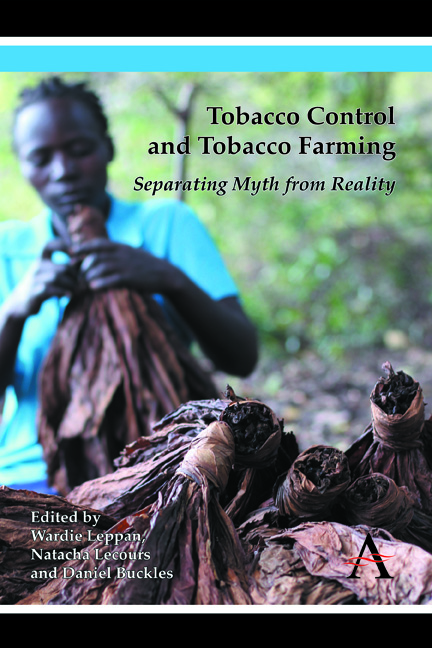Book contents
- Frontmatter
- Contents
- List of Figures, Tables and Photographs
- Foreword
- Preface
- Introduction: Separating Myth from Reality
- Section One The Determinants of Tobacco Leaf Demand
- Section Two Tobacco-Farming Conditions in Low- and Middle-Income Countries
- Section Three Economically Sustainable Alternatives to Tobacco
- Chapter 5 Breaking the Dependency on Tobacco Production: Transition Strategies for Bangladesh
- Chapter 6 Substituting Bamboo for Tobacco in South Nyanza Region, Kenya
- Chapter 7 Diversification Strategies for Tobacco Farmers: Lessons from Brazil
- Conclusion: Reframing the Debate on Tobacco Control and Tobacco Farming
- Annex: A Policy Brief on Tobacco Control and Tobacco Farming
- Contributors
Chapter 7 - Diversification Strategies for Tobacco Farmers: Lessons from Brazil
from Section Three - Economically Sustainable Alternatives to Tobacco
Published online by Cambridge University Press: 05 November 2014
- Frontmatter
- Contents
- List of Figures, Tables and Photographs
- Foreword
- Preface
- Introduction: Separating Myth from Reality
- Section One The Determinants of Tobacco Leaf Demand
- Section Two Tobacco-Farming Conditions in Low- and Middle-Income Countries
- Section Three Economically Sustainable Alternatives to Tobacco
- Chapter 5 Breaking the Dependency on Tobacco Production: Transition Strategies for Bangladesh
- Chapter 6 Substituting Bamboo for Tobacco in South Nyanza Region, Kenya
- Chapter 7 Diversification Strategies for Tobacco Farmers: Lessons from Brazil
- Conclusion: Reframing the Debate on Tobacco Control and Tobacco Farming
- Annex: A Policy Brief on Tobacco Control and Tobacco Farming
- Contributors
Summary
Introduction
In 2008, a World Health Organization study on economically sustainable alternatives to tobacco growing (WHO 2008, paragraphs 27 and 32–34) concluded that simply replacing tobacco with another cash crop was unlikely to be sufficient to sustainably reduce the vulnerability of small tobacco farmers and improve their quality of life. They argued that the diversification of agricultural activities and the development of non-agricultural opportunities would be needed to improve the livelihoods of tobacco farmers and facilitate their transition out of tobacco farming.
This chapter examines Brazil's attempts to move in this direction. It starts with a review of the main features of tobacco production in Brazil, including its strong orientation towards export markets, and the challenges to livelihood diversification these features present. The perspective of tobacco farmers is then explored by delving into explanations of why they grow tobacco and an assessment of the economic gains and losses of tobacco farming compared to more diversified farming systems. These assessments form the background for an in-depth examination of Brazil's National Program for Diversification in Tobacco-Growing Areas and the reasons why it has not yet achieved its potential. The chapter argues that the program lacks policy coherence and in particular fails to recognize that livelihood diversification requires a territorial approach that goes beyond the boundaries of current tobacco-growing areas. Further development of the program will need to create broader political conditions for livelihood diversification while at the same time making use of existing policies for sustainable rural development.
- Type
- Chapter
- Information
- Tobacco Control and Tobacco FarmingSeparating Myth from Reality, pp. 211 - 246Publisher: Anthem PressPrint publication year: 2014



